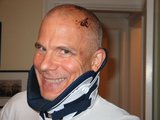Your humble servant Professor B had the privilege of running the Philadelphia Marathon on Sunday, November 23, 2008. The bottom line: 3:51:51, average pace per mile 8:50.7. In relative terms, that's 2529th out of a field of 7261 finishers.
For those who like to look at pictures, I have a couple over here.
If you like both pictures and sound, feel free to download this clip of me expressing my gratitude to runner and running guru Rick Morris of runningplanet.com, and while you're at it don't forget to view the incomparably profound postscript to that message. (My watch said a couple minutes less than my chip time, most likely because I accidentally stopped my timer for a while while fumbling with the splits. I was deluded when I was bragging about 8:49:something in the video clip.)
If you like textual narrative, please read on while you wait for those fat-ass AVI videos to download.
* * * * *
As I mentioned in a previous post, I signed up for my first marathon and began training in earnest last summer, following a program intended to prepare you to run a four-hour marathon. It usually called for six training days per week -- though I was not able to fit in more than five -- and mixed various types of workouts. With precise instructions as to speeds and distances, the program is highly scientific and technical, designed to develop speed, endurance, lactate acid processing, oxygen uptake, and so forth. The treadmill was more a necessity than a convenience for accurately regulating speed, so I did a mix of treadmill and outdoor running.
The coolest thing about this training regime is that it works. My wheels got a little beaten up at times, but my engine kept getting stronger. It was also highly addictive. Crack pipe became my nickname for the treadmill. The "easy" runs, at slower than marathon goal pace, were times of soothing relaxation and enjoyment.
I did my last of a series of progressively longer "long" runs on Election Day, November 4. I cast my vote for Barack and ran my 23 miles, and was more than pleased with the outcome of both contests. Per the program, there followed a sort of holy period where you run relatively little, concentrating instead on recovery from the last long run while staying tuned up for the great day.
My girlfriend -- let's call her Amy, to protect the innocent -- was phenomenally supportive throughout this project. Empathic and generous by nature, she also knows from experience what it's like to train and run races. We made arrangements for the care of our respective children and drove together to Philadelphia on Saturday to stay overnight a downtown hotel.
Also lodged at the hotel were our friends, whom we'll call Jennifer and Alain. The latter, an experienced marathoner, is the one who encouraged me to get into this endeavor (i.e., it's all his fault). He was not wedded to meeting or beating a 4-hour goal, so we agreed to run together for as much or as little of the way as felt comfortable, and he encouraged me to move ahead whenever I felt the need.
I made a point of sleeping adequately Friday into Saturday because having known myself for a full 50 years, I expected the jitters might keep me up Saturday night. Indeed, I slept maybe 3.5 hours, but I didn't worry too much about that. Hey, you can always take a nap after the race, right?
My anxiety level was moderate to low the day and night before. But in the morning, as the final minutes ticked off before I was due to meet Alain in the lobby and head over to the site, I was a basket case, anxiously buzzing around the room looking for things that I should have arranged neatly the night before. I thought I had allowed plenty of time, but this was a valuable lesson for next time: organize all your stuff, attach your chip and your bib, set out your clothing and accessories the night before rather than the morning of.
Temperatures at 6:30 a.m. were in the upper 20's. Cold. I did what my marathon-experienced friend recommended: wore a couple outer layers of cotton things that should have been donated to charity long ago, and discarded them in the street once I warmed up.
Within the first few miles Alain checked a mile marker against his watch, and announced that either the mile marker was substantially off or else we were going way too fast. I have since heard rumors that some of the early mile markers were in fact misplaced. A little later, by my calculation we were behind schedule by more than two minutes. We probably slowed down too much, overcompensating for the miles we wrongly thought we had run too fast.
In the days before the race I had gotten the idea of printing out a timetable indicating what time should have elapsed at each mile, laminating it, punching two holes in the lower corners and pinning it upside down to my windbreaker for reference. I actually had this laminated thing ready to go in my hotel room, then discarded the idea because at the last moment I didn't have time or inclination to fool around with any more safety pins. It wasn't till dinner the night before that I heard from Alain that the idea has already been thought of, in the form of a bracelet that you can fashion out of paper and tape, and rotate around your wrist. Duh. That's another lesson for next time: if you're the obsessive sort who likes to know where he is and you're not a savant whose glucose-starved brain can perform hour-minute-second arithmetic on the fly, then carry your little reference thingy if it makes you happy.
After about the first third or so, I moved on ahead of my friend because I was interested in getting back on schedule. Later I calculated that I had overcompensated again and was a couple minutes ahead of schedule, and slowed back down. Meanwhile my friend picked it up a little and we met again about half way through. Amy positioned herself somewhere near the half-way point at a strategic time and waited to greet us as we came around a turn and down a hill. It was well worth stopping for a mid-race hug and a kiss.
At some point I became uncertain whether I was ahead of schedule or behind, but thought most of the miles had probably been fast enough. I focused on the individual mile splits and maintaining a decent pace, staying around 8:45 to 9:00. I monitored my fatigue level, wondering if I was running stupid or smart. I enjoyed the scenery and the rhythm of the feet, and had a good time. The atmosphere was pleasant and convivial, the spectators and volunteers enthusiastic.
Alain and I ran together till around mile 18 or so and then I decided to pick up the pace, as I had planned to do. I went ahead, telling him he might see me later weeping by the side of the road.
After mile 20 I was looking for signs of serious fatigue, wondering again if I was going to crash into the dreaded wall about which I have heard so many horror stories. But the last several miles went by fast and I felt remarkably comfortable. I was passing people all over the place, as if walking through a room full of people standing still. Soon we were almost home and I stepped on the gas a little harder. I ran the last 200 meters at a dead run.
It really was glorious, an incredible thrill, busting it across the finish line with crowds of cheering people left and right. Without question, the whole race was one of the most rewarding and enjoyable experiences of my life. I am astonished that this body was able to do what it did, and I am overwhelmed with gratitude for being healthy enough and having a sufficently lucky and privileged life to accomodate the training.
The wall must have been somewhere beyond 26.2 because I never hit it. Since the race I have been tempted to second-guess myself, thinking I might have run more aggressively, but that's stupid. Which mistake would you rather regret? It's a delicate balance between fuel conservation and performance.
And it's interesting, is it not, how gratitude and greed can exist side by side. On the one hand you have tears of gratitude welling up in your eyes, and in next instant you're demanding more, scheming and planning to beat this performance next time. Who's up for the New York Marathon in 2009?
PS: my gratitude to the good people at the downtown branch of Urban Athletics for providing excellent advice, apparel and shoes.


